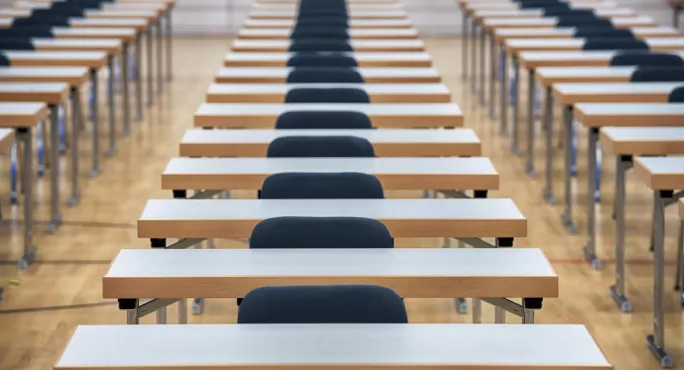It is expected that GCSE and A-Level grades will be based on teacher assessments and the results of mocks, heads leaders say.
It is thought these proposed grades could be submitted to exam boards to check to ensure “consistency and fairness”.
It was announced on Wednesday that the exams in England and Wales will be cancelled this year, although the prime minister has said there are plans for students to still receive qualifications.
Quick read: Exam plan announced tomorrow
Coronavirus: All schools in England closing from Friday to majority of pupils
Williamson: Open schools won’t be educational
Teachers, pupils and their families are now waiting to hear how students will receive the qualifications they have been working towards for the last two years.
Education secretary Gavin Williamson has said the government will work with schools, colleges and exams regulator Ofqual “to ensure children get the qualifications they need”.
In an interview on BBC Radio 4‘s Today programme, Mr Williamson said that guidance will be issued tomorrow about how pupils unable to sit their exams due to school closures will get their grades.
Geoff Barton, general secretary of the Association of School and College Leaders, said: “We are waiting for details from Ofqual about how GCSEs and A levels will be assessed and grades awarded in lieu of exams.
“However, we expect that it will be based on teacher assessment supported by evidence of internal assessment that has already taken place such as mock exams, and that this will be submitted to the exam boards which will then check submissions to ensure consistency and fairness and award grades accordingly.
“The vast majority of teachers endeavour to give accurate assessments, but the decision to suspend school and college performance tables this year will remove any incentive to do otherwise.
“There will clearly need to be an appeal procedure if candidates feel they have been disadvantaged, and inevitably a great many questions remain about how all of this will work.
Paul Whiteman, general secretary of the NAHT school leaders’ union, said: “We are just getting to that maximum point of stress for students about to take those exams, and it will be heartbreaking because they have put so much work in - not just in the last year and few months, but throughout their school career.
“So that will be absolutely heartbreaking for a lot of them. Although it’s pressurised, a lot of them would have been looking forward to grades.
“We know that whatever the system comes up with, whatever the government recommends, it won’t be perfect - but what we’re trying to get to is a system where most students will be confident that they have been assessed and awarded a recognition of their ability going forward.
“But what’s really important is that we make sure there’s some kind of appeal mechanism or recovery mechanism, if anybody says: ‘No, I would have got a much better grade than that.’”
Mr Williamson has said the government would do everything it could to ensure children get their results in August.
Alistair Jarvis, chief executive of vice-chancellors’ group Universities UK, said that if exam grades cannot be awarded as usual this summer, then one option may be to give university places based on an assessment of things such as an applicant’s predicted grades and personal statement.
“I think that’s doable,” he said. “It is not preferable as it is very tricky.”
He added: “We are going to have to write new rules. This is completely unprecedented. It is possible to find a way to issue students places.”





